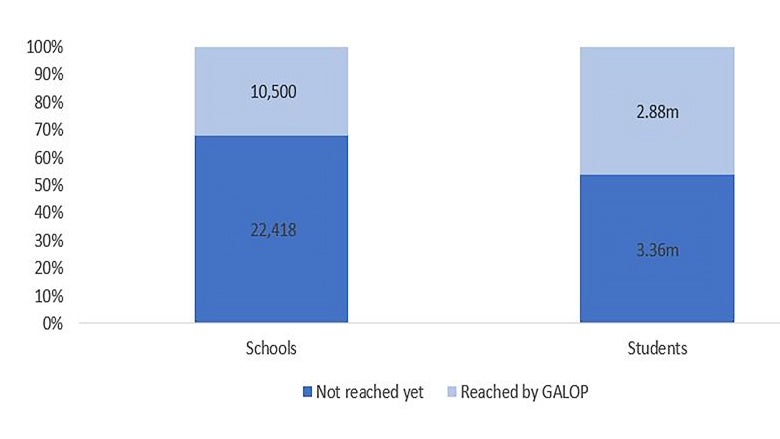 How Ghana Is Improving Learning For Every Child
How Ghana Is Improving Learning For Every Child
During my last trip to Ghana, I saw a classroom full of eager young boys and girls, hands raised, waiting patiently to be called to answer questions – each vying to catch the eye of their teacher and craning their necks to be noticed. One after another, the children picked up their books, selected the sections they wanted to read, and then read with pride.
This is a direct outcome of Ghana’s strong focus on reaching every child with quality education, as I witnessed that day when I visited the New Gbawe Municipal Basic School in Accra, a beneficiary of the Ghana Accountability for Learning Outcomes Project (GALOP), a government initiative supported by the World Bank.
GALOP is a great example of how projects can leverage the principles of the Western and Central Africa Education Strategy launched one year ago in Ghana to improve education for all in the region.
Two elements are worth highlighting: a strong focus on learning outcomes and innovative evidence-based interventions, accompanied by building stronger, accountable, and transparent education systems.
Developing cognitive skills
GALOP has a strong focus on learning outcomes, complementing efforts to improve access, equity, and governance in the education sector. Classrooms are regularly assessed and learning outcomes are also measured through large-scale assessments. This builds on existing evidence showing that rather than focusing on school attendance, developing cognitive skills is critical to improve access to quality jobs, better earnings, and delivering economic growth.
Evidence-based teaching practices

Good teachers are the most important driver of learning. Through the GALOP project, Ghana is empowering teachers with a structured program, providing them with lesson plans, learning materials, ongoing skills-based coaching , as well as mentoring and continuous classroom observations. All of these innovations have been proven to increase learning at scale at a relatively low cost in the region. Teachers are encouraged to use play-based learning and benefit from virtual training through a digital platform where they can access recordings of best teaching practices.
To further strengthen education systems, the project is also providing grants for low-performing schools and supporting accountability systems that provide information to parents and communities.
Scaling up results
The impact of the project is visible. To date, more than 72,000 teachers have been trained to use innovative teaching approaches in their classrooms. The share of schools with teaching practices meeting inspection standards has increased from a baseline of 3.3% to 65%. Students in GALOP schools are more likely to have trained teachers and a lower student teacher ratio. More than 80% of primary schools have student-to-trained teacher ratios below 50:1, an improvement from a baseline of 75% of primary schools.
Although data is still being analyzed to compare the performance of GALOP schools with non-participating ones, there are positive indications from the field that learning outcomes are improving. In fact, it is highly likely that by age 10, students in GALOP schools are proficient in foundational skills like reading and basic arithmetic, laying a solid groundwork for advanced learning in subsequent years.
Students and schools reached by GALOP

Over 2.9 million learners across more than 10,000 schools — which constitutes one in three schools in the country — are currently benefiting from GALOP. Insights from these schools offer invaluable lessons for scaling up the project both within Ghana and replicating its success in other countries.
First, interventions which balance school accountability with sufficient autonomy for innovation can significantly boost learning outcomes. Second, empowering teachers with the necessary resources is vital to ensure their teaching practices are focused on learning. Finally, systematic and regular measurement is critical. It not only allows for timely adjustments to learning approaches but also ensures that the ultimate objective, genuine learning in the classroom, is realized.
With efforts to scale up successful interventions such as GALOP to reach every child, Ghana is helping fulfill the aspirations of every girl and boy to get ready to learn, acquire real knowledge, and enter the job market with the right skills to become productive and fulfilled citizens.
Given its promising results, expanding the scale of the project to reach every child can certainly contribute to better learning opportunities in Ghana and its impact can even inspire other countries in the region to replicate similar efforts. It is so inspiring to see how education can transform people’s lives.
We have much to learn from Ghana’s experience.


Join the Conversation